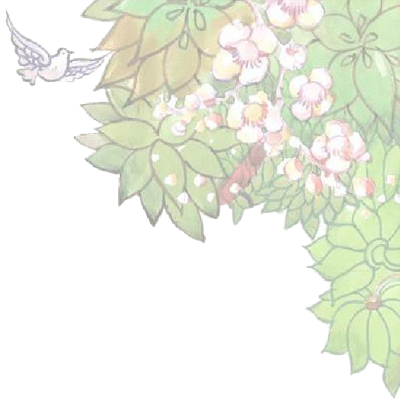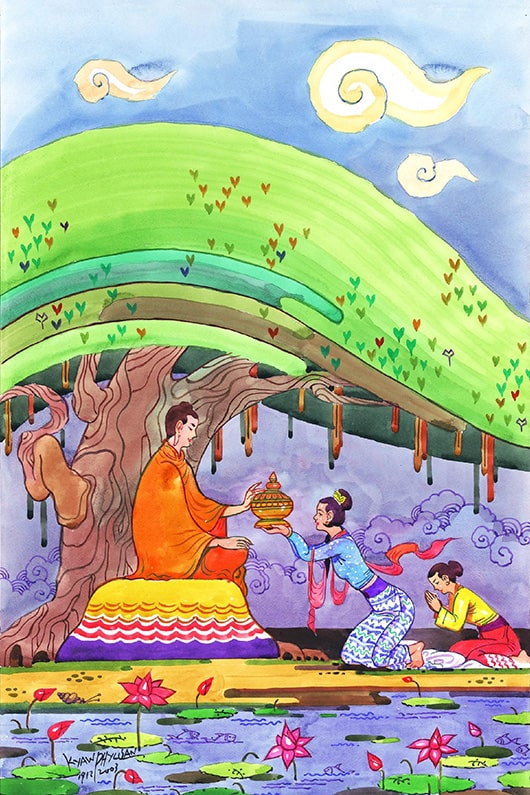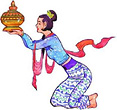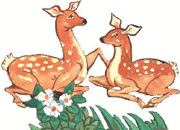19話 スジャーターの乳粥

第2部 成道へ
第1章 苦行
19話 スジャーターの乳粥

菩薩(ボーディサッタ)の五大夢
みずから極端な苦行(ドゥッカラチャリヤ)をやるのと、みずから極端な放埒にふけるのと、その両極端を避けることによって菩薩は実践のやりかたを変えた。菩薩は中道をたどり、冥想で意義深い進歩を得ることが可能になった。紀元前588年のウェーサーカー月(現代暦の五月ごろ)の月が満ちていく十四日目、夜明けが近づいているとき、菩薩は五大夢を見た。それは、近く目標を達成しそうな菩薩にのみ見られる前兆としての夢だった。
五大夢とは、それぞれの夢の意味が、かれみずからによって、次のように解釈されている。
(1)大地を寝台にして、山々の王・ヒマラヤ山脈を枕に、かれは寝ている。左手は東の大洋に、右手は西の大洋に、両足は南の大洋に、それぞれ置かれている・・・。
この最初の夢は、かれが至高の明智をさとり、人間、神々(デーヴァー)、梵天(ブラフマー)のあいだで目覚めた者(ブッダ)となるであろう、ということを予告していた。
(2)ティリヤ草(訳注:軛ほどの大きさの赤みを帯びた茎をもつ蔓草の一種。軛は牛車をひく二頭の牛の首をつなぐ弓状の器具)が、かれの臍から現れ、高く高く天に届くまで育ち、何千ヨージャナ(何万㌔)もの上空にとどまっている・・・。
この二番目の夢は、かれの聖八正道(アリアアッタンギカマッガ)と中道(マッジマパティパダー)の発見を予告していた。そしてまた、かれが人間と神々にそれを教えることができるであろう、ということを予告していた。
(3)白い胴体に黒い頭部のウジ虫の大群が、かれの足のつま先から膝小僧まで覆って、のろのろと這っている・・・。
この三番目の夢は、純白の服を着たものすごい数の人びとがブッダを崇拝し、ブッダの生涯の間に、偉大な帰依をするであろう、ということを予告していた。
(4)さまざまな色、つまり青、金、赤、灰の四種の色の鳥が四方から飛んでくる。舞い降りるとかれの足もとにひれ伏し、どれも白くなっている・・・。
この四番目の夢は、戦士階級、司祭(ブラーフマナ)階級、商人(ヴェッサ)階級、貧民(スッダ)階級という四つのカースト(生まれによる身分制度)が、ブッダの教えを喜んで受けいれるであろう、ということを予告していた。かれらは比丘となって阿羅漢になるであろう、と。
(5)巨大な糞の山の上で、それにまみれることもなく、かれが行ったり来たり、歩いて往復している・・・。
この五番目の夢は、世尊が衣、食、住、薬の出家の要具を得てもそうしたものの危険を知って、目的をわかったうえで、強欲や錯覚や執着なく、それらを使うであろう、ということを予告していた。
スジャーターが乳粥を献上する
夜明けになって、菩薩はからだを洗い清めてから、山羊飼いのバニヤン樹(原注:パーリ語ではajapāla nigrodha (アジャパーラ ニグローダ)、ラテン語ではFicus bengalensis(フィクス ベンガレンシス)のもとへ行った。托鉢へまわりに行くまでのあいだ、その木の下に坐った。かれのからだは輝かしい光を放ち、バニヤン樹全体がその光で照明された。
市場町セーナーニにはスジャーターという心の寛やかな女性が住んでいた。この町のセーナーニー長者の娘で、およそ二十年前、バニヤン樹のもとへ行き、こう祈願したのだ。
「ああ、守り神さま、もし、わたしが同じカーストの裕福な家に嫁げて、息子を授かりましたら、お礼に参りまして、乳粥(パーヤーサ)を毎年献上いたします」
スジャーターの願いは満たされ、毎年ウェーサーカー月の満月の日にお礼参りをして、乳粥をバニヤン樹の守り神に献上した。
スジャーターは守り神にお礼参りをするに当たって、乳粥の献上のために、いささかの準備をした。
味の濃い、風味ある、滋養ゆたかな乳を得るために次のような手順を踏んだのである。①まず、千頭の牛を甘草林に放牧する。それらから得た乳を、別の五百頭の牛に飲ませて育てる。②この五百頭の牛の乳を、別の二百五十頭の牛に飲ませて育てる。③この二百五十頭の牛の乳を、別の百二十五頭の牛に飲ませて育てる。④この百二十五頭の牛の乳を、別の六十五頭の牛に飲ませて育てる。⑤この六十五頭の牛の乳を、別の三十二頭の牛に飲ませて育てる。⑥この三十二頭の牛の乳を、別の十六頭の牛に飲ませて育てる。⑦この十六頭の牛の乳を、別の八頭の牛に飲ませて育てる。
そのウェーサーカー月の満月の日、スジャーターは乳粥を献上するために朝早く起きた。乳搾りしなければならない牛は八頭ある。乳搾りすると、こんなふしぎな出来事を見た。牛の乳房の下に乳碗を置くと、搾りもしないのに乳が次々にたっぷりあふれ出てくるのだ。それから、みずから乳粥をこしらえた。
スジャーターが乳粥の調理をしていたときは、神々と梵天は彼女に姿を見せることなく手伝っていたので、ひたすらふしぎな出来事だと思っていたのである。調理中、下女を呼んで、こう命じた。
「プンナー、急いでバニヤン樹のもとへ行って、木の下の守り神のお住まいを掃除しておいで」
「かしこまりました、奥さま」と、プンナーは答え、すぐさま大急ぎでバニヤン樹のもとへ行った。着くと、菩薩が木の下で東へ顔を向けて坐っている。木全体が菩薩のからだから発する光で黄金に輝いていた。プンナーは深い畏敬の念を抱き、こう思った。(バニヤン樹の守り神が降りてこられている。乳粥の献上をご自身の両手で受けとられるみたいだわ)
それで彼女は急いで飛んで帰り、スジャーターに出来事を報告した。
「ああ、奥さま、わたしはバニヤン樹の守り神が木の下で冥想して坐っておられるのを見ました。奥さまの献上をご自身の両手で受けとられるために、木から降りてこられています。きょうは奥さま、とっても幸運でございます」
スジャーターはその知らせをきいて、とても幸福だった。喜びにあふれて下女とともに踊り、下女にふさわしい着物や装飾品を与えた。それから、調理した乳粥を黄金碗に入れた。黄金碗は十万金の値打ちがあるもので、きれいな白い布に包んだ。盛装に身を包んで飾り、黄金碗を頭の上に乗せ、プンナーをつれてバニヤン樹のもとへ行った。
菩薩が木の下で冥想して坐っているのを見るやいなや、彼女の心は喜びにみたされ、あふれんばかりであった。みばえがして、もの静かで、からだ全体が、輝く光をバニヤン樹のまわりに放っているのだ。彼女は実のところ、守り神が菩薩だとは知らなかった。目に入った場所からうやうやしく近づいて行った。それから適当なところに座り、頭の上の黄金碗を下げおろし、蓋をあけた。
アノーマー川の岸辺で菩薩が出家したとき、ガティカーラ梵天が提供してくれて、そのまま今まで持っていた土製の鉢が突如消えた。その鉢を見ることもなく、菩薩は両手をのばして黄金碗の乳粥を受けとった。心づくしの強い思いと大きな喜びを感じながら献上しているあいだに、彼女はこう言った。
「尊い方よ、この黄金碗の乳粥をどうぞお受けとりくださいませ」
それから祈願のことばを発した。
「わたしの願いが満たされましたように、あなたさまの大望もすべて、どうぞ満たされますように」
もう一度お辞儀をして席から立ち上がり、数歩あとずさって踵を返し、帰宅した。
菩薩もまた、席から立ち上がり、碗を取り、ネーランジャー川の岸辺に向かった。碗を脇にもって、スッパティッディタ沐浴場で水浴びした。沐浴場から出てくると、黄金碗をもち、木の下の涼しい木陰に坐った。まず乳粥を四十九口に分け、それからじっくり考えた。(七週間のあいだ、この四十九口の乳粥が、どうぞわたしのからだを支えてくれますように)そして、食べ始めた。
食べ終わってから黄金碗を川にもっていき、こう心に決めた。「もし万一、きょうわたしがブッダになるのなら、どうぞこの黄金碗が上流へ流れて行きますように。もし、きょうわたしがブッダにならないのなら、この黄金碗は流れとともに下流へ流されるがままになりますように」そしてかれは黄金碗を川に浮かべた。黄金碗が水の上に置かれるやいなや、奇跡のように流れを横切り、川の中ほどへ動いた。流れに抗して上流へ八腕尺(約四㍍)ほど流れ、渦の中へ、龍王カーラの棲みかへ、と沈んでいったのであった。
※ 画像やテキストの無断使用はご遠慮ください。/ All rights reserved.

Episode 19. THE MEAL OFFERING OF Sujātā
The Five Great Dreams of the Bodhisatta
Having changed his method of practice by avoiding extreme self-mortification (dukkaracariya) and extreme self-indulgence, the Bodhisatta followed the middle path, which enabled him to obtain significant progress in meditation. On the fourteenth waxing day of Vesākha, 588 B.C., when it was approaching dawn time, he dreamed Five Great Dreams—dreams which only a Bodhisatta could dream as a premonition that he was about to attain his goal.
The Five Great Dreams, with their meanings being interpreted by
himself, were as follows:
(1) He dreamed that he was sleeping on the great earth as his couch, with the Himalayas—the king of mountains—as his pillow; his left hand laid in the Eastern Ocean; his right hand in the Western Ocean; both his legs in the Southern Ocean. This first dream presaged his realising Supreme Enlightenment and becoming a Buddha among humans, devas and brahmās.
(2) He dreamed that a tiriya grass—a species of grass with reddish stalk about the size of a yoke—emerged from his navel, and it grew up higher and higher until it touched the sky, the open space, many thousands of yojanas above, and it remained there. This second dream presaged his discovery of the Noble Eightfold Path (Ariya Aṭṭhaṅgika Magga)—the Middle Way (Majjhimā Paṭipadā). And it also presaged that
he would be able to teach it to humans and devas.
(3) He dreamed that hordes of maggots with white bodies and black heads slowly crawled from his legs covering them from the tip of the toes up to the knee-cap. This third dream presaged that a great many people who wore pure white clothes would adore the Buddha and take Great Refuge in Him during His life.
(4) He dreamed that four kinds of birds with different colours, i.e. blue, golden, red and grey, came from the four quarters. When they alighted, they laid prostrate at his feet and became white. This fourth dream presaged that the four castes—the warrior caste(Khattiya), the brahmin caste (Brāhmaṇa), the merchant caste (Vessa),
and the poor caste (Sudda)—would embrace the teaching of the Buddha; they would become bhikkhus and attain Arahantship.
(5) He dreamed that he was walking to and fro, back and forth, on a huge mountain of excreta without getting besmeared. This fifth dream presaged that although the Perfect One would obtain the requisites of robes, alms food, abode, and medicine, yet He would use them without greed or delusion or clinging, perceiving their dangers and understanding their purpose.
The Offering of Milk-Rice by Sujātā
When the day-break came, the Bodhisatta cleansed his body, after which he went to a goatherds’ banyan tree (Pāḷi: Ajapāla nigrodha; Latin: Ficus bengalensis). He sat down at the base of the tree waiting for the time to go on alms-round; his body was radiating light so brilliantly that the whole banyan tree was illumined by his radiance. In the market town of Senāni (Senānigama), there lived a generous
lady named Sujātā, the daughter of Senānī—a rich man of the town. About twenty years ago, she went to the banyan tree and prayed: “O guardian deva, if I am married into a rich family of the same caste and am bestowed a son, I will pay homage to you with the offering of milk-rice (pāyāsa) every year.” As Sujātā’s prayer was fulfilled, she paid homage and offered milk-rice to the guardian deva of the banyan tree on the full-moon day of Vesākha every year. When it was time to pay homage to the guardian deva, Sujātā made some preparations for the offering of milk-rice. To obtain the thick, savoury and nutritious milk, she took the following steps: (1) she first let one thousand cows graze in a liquorice wood; the milk obtained from the cows would be fed to another five hundred cows; (2) the milk produced by these five hundred cows would be fed to another two hundred and fifty cows; (3) the milk produced by these two hundred and fifty cows would be fed to another one hundred and twenty-five
cows; (4) the milk produced by these one hundred and twenty-five cows would be fed to another sixty-four cows; (5) the milk produced by these sixty-four cows would be fed to another thirty-two cows; (6) the milk produced by these thirty-two cows would be fed to another sixteen cows; (7) the milk produced by these sixteen cows would then be finally fed to another eight cows. On that full-moon day of Vesākha, Sujātā arose early in the morning to make the sacrificial offering of milk-rice. She had the eight cows milked. When she did it, she saw such a wonderful event that as the
milk bowl was placed closely under the udder, the milk flowed down continuously in profusion without being drawn. Then, she herself made an effort to cook the milk-rice. When she cooked the milk-rice, devas and brahmās gave their help without being seen by her—she only perceived them as wonders. While she was cooking, she called her maid servant and ordered her: “Puṇṇā, please go quickly and clean up the base of the banyan tree, the residence of the guardian deva!” “Very well, my lady,” replied Puṇṇā, who immediately made haste and went to the banyan tree. When she arrived, she saw the Bodhisatta sitting at the foot of the tree facing east, the whole tree shining in golden yellow with the radiance from the Bodhisatta’s body. She was
deeply awed, thinking: “The guardian deva of the banyan tree has come down; it seems he is sitting there to receive the offering with his own hands.” Then, she hurried back home and reported the matter to Sujātā, saying: “O my lady, I saw the guardian deva of the banyan tree being seated under the tree meditating. He has come down from the tree to receive your offering by his own hands. You must be very lucky today.” Sujātā was very happy to hear the news; she danced joyfully with her
maid servant and bestowed on her all the suitable apparel and ornaments. She then put the cooked milk-rice in a golden bowl worth one lakh and wrapped them up with a piece of clean white cloth. Having adorned herself in full attire and carrying the golden bowl on her head, she went to the banyan tree with Puṇṇā. On seeing the
meditating Bodhisatta—good-looking, serene, with his whole body radiating brilliant light around the banyan tree—her heart was inundated with joy. She did not know that her guardian deva was actually the Bodhisatta. She approached him in a respectful manner from where she saw him. Then she sat down in a suitable place, lowered the golden bowl from her head and opened it. The earthen alms-bowl—offered by Brahmā Ghaṭikāra at the time of the Bodhisatta’s renunciation on the bank of the Anomā River and remained with him so far—suddenly disappeared. Not seeing his alms-bowl, the Bodhisatta stretched out his hands to receive the golden bowl of
milk-rice. While offering it with great devotion and happiness, she said: “Venerable sir, may you accept the milk-rice together with this golden bowl.” Then, she uttered words of wish: “As my wishes had been fulfilled, may all your aspirations be fulfilled, too.” Once again she paid respect to him, stood up from her seat, walked backward a few steps, turned around and went home. The Bodhisatta also rose from his seat, took the bowl and proceeded to the bank of the Nerañjarā River. He kept the bowl aside and took a bath in the Suppatiṭṭhita Ford. Having come out from the ford, he took
the golden bowl and sat under the cool shade of a tree. He first made the milk-rice into forty-nine morsels and contemplated: “May these forty-nine morsels of milk-rice serve as nutrients to sustain my body for the entire seven weeks.” Then, he started to eat. After taking his food, he took the golden bowl to the river and made a resolution: “If I were to attain Buddhahood today, may this golden bowl float upstream; if I would not attain Buddhahood today, let it float downstream with the current.” He then let the golden bowl float in the Nerañjarā River. Miraculously, as soon as the golden bowl was put on the water, it cut across the currents and moved towards the
middle of the river; it floated upstream—against the currents—for about eight cubits and sank in a whirlpool to the abode of Kāḷa, the nāga king.
※ 画像やテキストの無断使用はご遠慮ください。/ All rights reserved.

アシン・クサラダンマ長老
1966年11月21日、インドネシア中部のジャワ州テマングン生まれ。中国系インドネシア人。テマングンは近くに3000メートル級の山々が聳え、山々に囲まれた小さな町。世界遺産のボロブドゥール寺院やディエン高原など観光地にも2,3時間で行ける比較的涼しい土地という。インドネシア・バンドゥンのパラヤンガン大学経済学部(経営学専攻)卒業後、首都ジャカルタのプラセトエイヤ・モレヤ経済ビジネス・スクールで財政学を修め、修士号を取得して卒業後、2年弱、民間企業勤務。1998年インドネシア・テーラワーダ(上座)仏教サンガで沙弥出家し、見習い僧に。詳しく見る
奥田 昭則
1949年徳島県生まれ。日本テーラワーダ仏教協会会員。東京大学仏文科卒。毎日新聞記者として奈良、広島、神戸の各支局、大阪本社の社会部、学芸部、神戸支局編集委員などを経て大阪本社編集局編集委員。1982年の1年間米国の地方紙で研修遊学。2017年ミャンマーに渡り、比丘出家。詳しく見る

※ 画像やテキストの無断使用はご遠慮ください。
All rights reserved.

